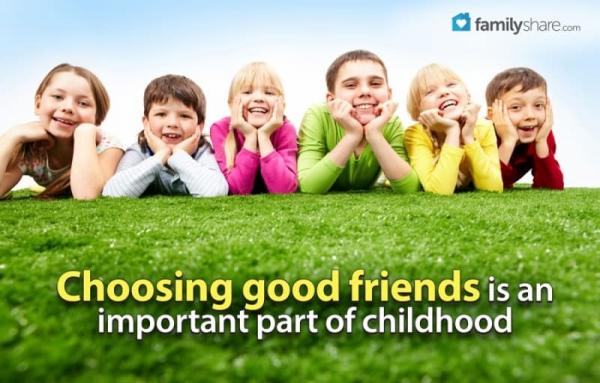
Friends. We all had them as children. Some were good influences, others were not. You chose, you learned, you grew. Whether your friends were good influences or bad, they ultimately had an effect on who you are today.
Now, you're a parent and the responsibility lies with you to teach your child how to choose wisely when it comes to friends. This can be a challenging and rewarding experience.
My mom always taught me to seek out other kids that seemed to be alone or have no friends. Similarly, I have tried to teach my children the same thing. Often, kids that are alone may need a good friend, but might be too shy or scared to find one without a little help or encouragement. Some great friendships have come as a result of my mother's advice.
Also, because I was taught strong values as a child, I leaned toward having friends who shared similar standards. Being taught from a young age about what was acceptable and what was not also helped me when I had friends who were not making good choices. I was able to separate the choice from our friendship and was then able to make educated decisions based on what was right and wrong - regardless of peer pressure.
As a mother of six children, I have a great concern about who my kids choose to be their friends. Friends are one of the greatest influences in young lives. I am working to teach and train my children to select good friends, as well as being a good friend in return. Here are some things that I think are key to helping this happen:
First and foremost, it is important to teach your child to BE a good friend
What is your definition of a good friend? Talk with your child about this. In HealthyChildren.org, author Colleen Marble suggests, "Talk with your child often about how friends should treat one another. Explain that good friends respect others, follow the rules, and help those in need." Describe qualities of good friends and inspire your child to cultivate these traits as well. Remember that the best teacher is YOU. Be an example of whom you want your child to become. Being a good friend will ultimately not only attract good friends, but also help your child to seek such comrades.
Be involved with your child
If you want your child to have healthy friendships, they need to have an equally healthy relationship with you. Listen to and talk with your child. Encourage and love your child. He needs to be able to trust you and what you are teaching. This can only happen if your child feels safe and respected at home.
Allow your child to have friends over; in fact, encourage it
The best way to know what is going on in your child's life is to see how they interact with friends. You can see whom she is selecting as friends, and whether it is a positive relationship, or if it needs correcting. Talk with your child about particular friends: Why do they like them? Do they encourage desired or negative behaviors? If your child is choosing poorly, talk with them about it and maybe create a rule that they can only play with the same friend again after they have played with three other friends. Slowly steer them in the right direction.
Though children come with their own personalities, parents and friends can have the greatest influence in their life. As a parent, be sure to cultivate an environment where they can learn to make correct choices on their own. Making high-quality friends and being a fine friend in return is a major key in their development as a person.

